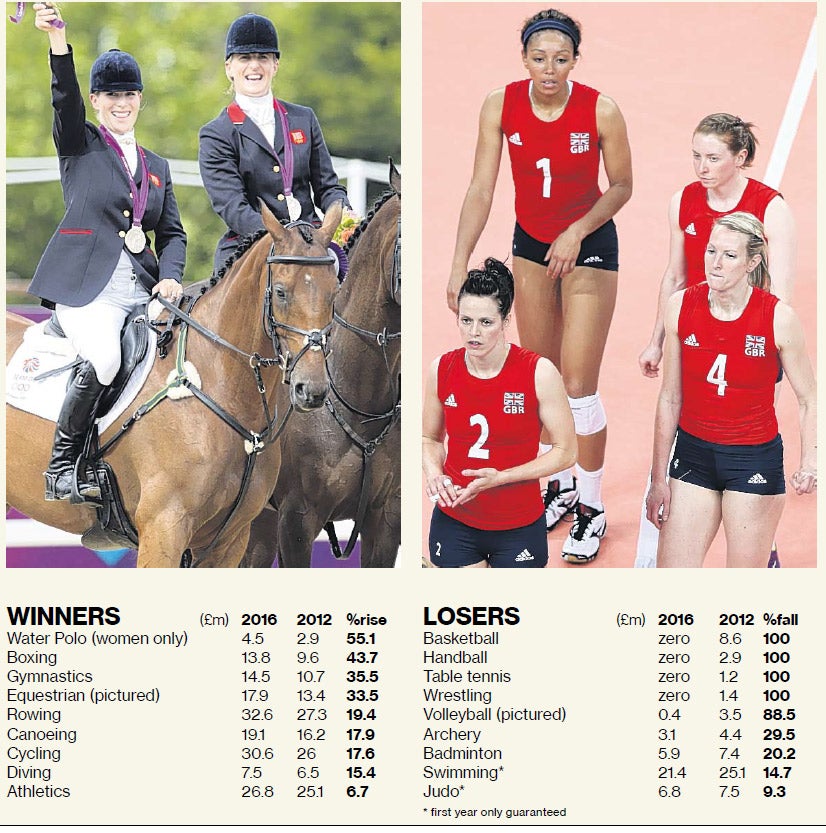Olympic Games: Struggling sports scorned in tough love programme of mission Rio 2016
Volleyball, handball and basketball left to count the cost – but the system is working

This morning it is three years and 231 days until the next Olympic Games begin. Yesterday the road to Rio was paved with gold for some 1,000 British athletes but for others it proved an abrupt and painful dead end. This Olympic year is not yet over and already dreams of 2016 have been shattered.
"UK Sport, London 2012, Seb Coe legacy? Gave everything & more because I believed your promises – false" tweeted Maria Bertelli, part of Britain's first-ever volleyball team to play in an Olympic Games.
Welcome to the tough love programme, the one that has turned Britain from an also-ran 16 years ago, when 303 athletes brought home one gold medal, into an Olympic superpower. Only the US and China bettered Britain in 2012. "Compassion without sentimentality," is how Sue Campbell, UK Sport's chair, put it yesterday as "Mission 2016" was unveiled. Volleyball received no money from Campbell's organisation, the body that hands out lottery and exchequer funds to sports through each Olympic cycle.
Get inside the tent and there is every chance an Olympic medal awaits – Britain's teams are as well, if not better, supported than any nation in the world, either through funding, coaching or general support systems. As well as the £347m that was shared out yesterday there is another pot of £80m, £10m of which will go towards coaching, £10m to research and innovation, and the rest on other areas that help make the marginal gains that so obsess those around British Olympic sport.
Those thrown outside the tent are left to fend for themselves at elite level, which means no Olympics. Basketball received £8.5m towards London. Yesterday it got nothing. At grass roots level the likes of volleyball and handball, such a hit with many spectators in London, are funded – via Sport England – in what is an increasingly integrated process. In simple terms it means those smaller sports are encouraged to grow from the bottom. Handball has already seen its participation numbers rise and will be rewarded should it continue to do so. In time, the theory goes, rising numbers will push up standards and performances.
Yesterday it fell to Liz Nicholl, UK Sport's chief executive, to make the calls. Swimming: down 15 per cent and a year on probation due to UK Sport's dissatisfaction with how the sport is being run. Volleyball: slashed from £3.5m to £400,000 specifically for beach volleyball (how can you have a Rio Games without a beach volleyball team?).
"It's not a punishment," said Nicholl. "It will be good news for some and it will be painful for others who haven't met the criteria. It's not been easy sharing these decisions. They are very disappointed but some of these sports have to improve their base, their competition structure, and drive up competition before they can really compete for medals.
"I hope the sports that have been hit will go to sports like hockey and gymnastics and talk to them about how they have got back to where they are today. Hockey had their funding cut [in the past], they went bust, they were in dire straits and they have done amazingly well to recover."
Hockey won a women's bronze in London and now receives £15.5m. Gymnastics was one of the notable winners. After Athens its funding was drastically cut – four medals in London earns it £14.5m towards Rio. Handball was given £2.9m for building Britain's first-ever team for London. Yesterday it received nothing.
For all the painful howls and tears yesterday from the ball sports, volley, hand and basket, and all the sympathy for those broken dreams – two weeks ago The Independent highlighted the case of Rachel Laybourne, the GB volleyballer who ran up debts of £10,000 in getting to London and has now left the sport – the system is thriving.
It demands high, medal-winning standards, of every sport. Sports have to identify named athletes who they believe can win a medal in 2016 – rowing, the big winners yesterday, listed 51. "The evidence of the summer is that people want to see a successful Team GB," said Hugh Robertson, the Sports Minister. And it demands value for money – it's our money, as Robertson and UK Sport like to point out.
The progress of sports is watched carefully throughout the cycle with funding distributed quarterly. Boxing received an increase, at 44 per cent the largest significant rise, but like swimming has been placed on a year's notice. There is some squabbling within the sport's governance by the Scots and Welsh – unless that is sorted by next autumn some funding could be removed. It is firm, it is harsh and it works. It is survival of the fittest. Roll on Rio.
Subscribe to Independent Premium to bookmark this article
Want to bookmark your favourite articles and stories to read or reference later? Start your Independent Premium subscription today.

Join our commenting forum
Join thought-provoking conversations, follow other Independent readers and see their replies